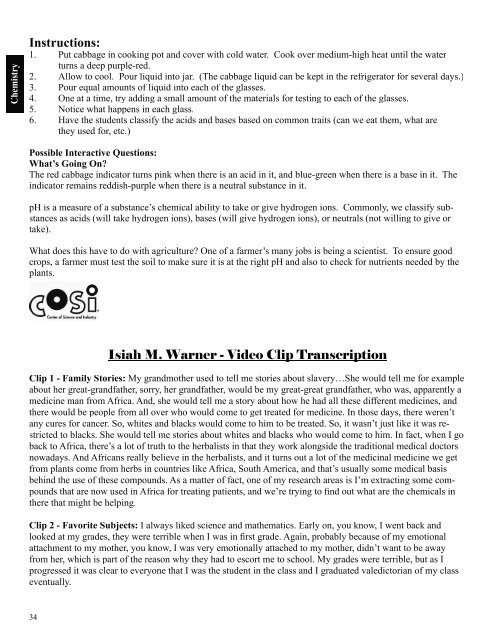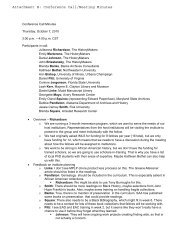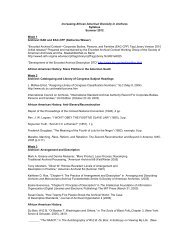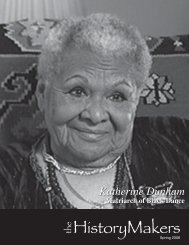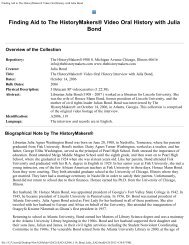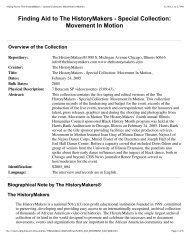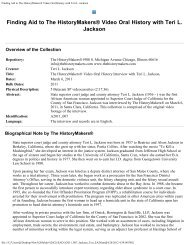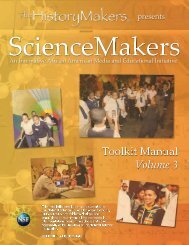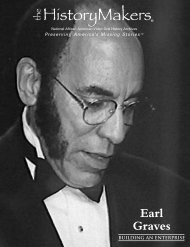ScienceMakers Toolkit Manual - The History Makers
ScienceMakers Toolkit Manual - The History Makers
ScienceMakers Toolkit Manual - The History Makers
Create successful ePaper yourself
Turn your PDF publications into a flip-book with our unique Google optimized e-Paper software.
Chemistry<br />
Instructions:<br />
1. Put cabbage in cooking pot and cover with cold water. Cook over medium-high heat until the water<br />
turns a deep purple-red.<br />
2. Allow to cool. Pour liquid into jar. (<strong>The</strong> cabbage liquid can be kept in the refrigerator for several days.)<br />
3. Pour equal amounts of liquid into each of the glasses.<br />
4. One at a time, try adding a small amount of the materials for testing to each of the glasses.<br />
5. Notice what happens in each glass.<br />
6. Have the students classify the acids and bases based on common traits (can we eat them, what are<br />
they used for, etc.)<br />
Possible Interactive Questions:<br />
What’s Going On?<br />
<strong>The</strong> red cabbage indicator turns pink when there is an acid in it, and blue-green when there is a base in it. <strong>The</strong><br />
indicator remains reddish-purple when there is a neutral substance in it.<br />
pH is a measure of a substance’s chemical ability to take or give hydrogen ions. Commonly, we classify substances<br />
as acids (will take hydrogen ions), bases (will give hydrogen ions), or neutrals (not willing to give or<br />
take).<br />
What does this have to do with agriculture? One of a farmer’s many jobs is being a scientist. To ensure good<br />
crops, a farmer must test the soil to make sure it is at the right pH and also to check for nutrients needed by the<br />
plants.<br />
34<br />
Isiah M. Warner - Video Clip Transcription<br />
Clip 1 - Family Stories: My grandmother used to tell me stories about slavery…She would tell me for example<br />
about her great-grandfather, sorry, her grandfather, would be my great-great grandfather, who was, apparently a<br />
medicine man from Africa. And, she would tell me a story about how he had all these different medicines, and<br />
there would be people from all over who would come to get treated for medicine. In those days, there weren’t<br />
any cures for cancer. So, whites and blacks would come to him to be treated. So, it wasn’t just like it was restricted<br />
to blacks. She would tell me stories about whites and blacks who would come to him. In fact, when I go<br />
back to Africa, there’s a lot of truth to the herbalists in that they work alongside the traditional medical doctors<br />
nowadays. And Africans really believe in the herbalists, and it turns out a lot of the medicinal medicine we get<br />
from plants come from herbs in countries like Africa, South America, and that’s usually some medical basis<br />
behind the use of these compounds. As a matter of fact, one of my research areas is I’m extracting some compounds<br />
that are now used in Africa for treating patients, and we’re trying to fi nd out what are the chemicals in<br />
there that might be helping.<br />
Clip 2 - Favorite Subjects: I always liked science and mathematics. Early on, you know, I went back and<br />
looked at my grades, they were terrible when I was in fi rst grade. Again, probably because of my emotional<br />
attachment to my mother, you know, I was very emotionally attached to my mother, didn’t want to be away<br />
from her, which is part of the reason why they had to escort me to school. My grades were terrible, but as I<br />
progressed it was clear to everyone that I was the student in the class and I graduated valedictorian of my class<br />
eventually.


